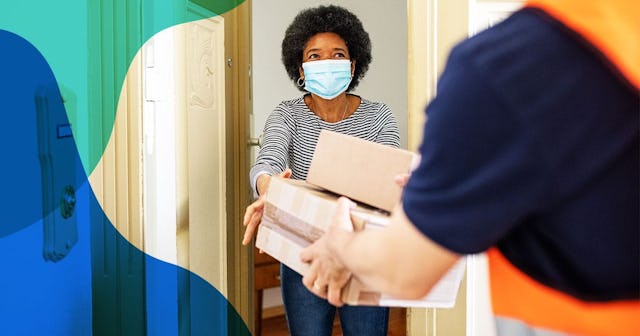COVID-19 Safety Doesn't Have To Be 'All Or Nothing'

In a picture perfect world, everyone would have abided by the CDC’s guidelines for social distancing, stay at home orders, and quarantine, until the number of COVID-19 cases became low enough to continue living life as normal (a place we still aren’t at today despite our country already reopening). But… that’s another topic for another time. Nevertheless, we’ve quickly discovered that some people’s lives are much too complicated to allow for that.
In the fast-paced, “real” world we usually live in, and will eventually have to go back to, parents have to work. Some kids have to go to daycare. Essential workers have to clock in despite their fear of potential exposure. You see, people need other people. Not just as a way to make the economy go round, but because we are wired to be with and do life with others.
Those of us who were once hunkered down — blinded by the bright light of day during a stay at home order — are finally beginning to venture out again. Not because this world is virus free, but because of the extra precautions we can take which have proven effective at slowing the spread of COVID-19. Unfortunately, despite what the studies may say, these safety methods are still being viewed as some type of political stunt.
Geri Lavrov/Getty
Let’s talk about face masks, for example. I know, I know… who wants to wear a face mask, especially in this heat? I get it. But the thing is, wearing a face mask is one way we can safely go back to the usual things we enjoy and have missed doing. Like, going to a graduation party, walking through the fairgrounds, or shopping at your favorite stores.
Dr. Jerome Adams, the U.S. Surgeon General, recently took to Twitter to clapback on the misconception that wearing a face mask impedes freedoms, saying that they can be a useful tool to slow the spread and reopen the economy.
“Some feel face coverings infringe on their freedom of choice,” Surgeon General Adams wrote in a recent tweet. “But if more wear them, we’ll have more freedom to go out.”
He then goes on to explain that face masks will reduce asymptomatic spread of the virus which will lead to more places opening sooner.
“Exercise and promote your freedom by choosing to wear a face covering!” Adams says.
Adams isn’t the first public health official to stress the importance of face coverings. Still, there seems to be a popular trend surfacing on the matter — people just can’t stop their complaining. It’s either a “pain in the ass to have to put a face mask on” or it’s “ridiculous that others are wearing them.” (These folks got their medical degree from Grey’s Anatomy, apparently.)
Whatever their problem may be, can you imagine being so self centered that you allow a minor inconvenience, or even a narcissistic annoyance, to take precedence over an entire community’s health? Lame.
Some innocent bystanders have been deliberately coughed on, harassed, and degraded for simply wearing a mask or asking that a customer wear one. And I have one question: How can someone be so dull that they can’t understand, or accept, that face masks are what is going to keep this country going?
All fifty states have started reopening, people are going back to work, and some kids will be returning to school in the fall. But, the thing is, nothing looks like how it used to before. We don’t have to look too far to see that our world has been forced to conform in a way that promotes better health. Hand sanitizing stations look about as natural to us as pop machines in the stores. At first, seeing a person in a mask was off-putting. Now (hopefully), you see people wearing them all over.
But just because our lives are resembling a new normal doesn’t mean that this is the time to be willy-nilly about COVID-19 safety. We don’t have to Lysol our groceries anymore (thank the good and mighty Lord for that), but some states are already beginning to see a rise in cases, and experts are telling us that America hasn’t even seen its second wave. This is in large part thanks to the people who are leaning to the “nothing” side of the “all-or-nothing” approach, returning to pre-COVID activities like it never happened and taking zero precautions to protect themselves or others.
In a recent article, NPR asked medical professionals to rate the most popular summer activities in terms of safety. Out of every activity, those with the highest risk were inside activities, such as attending a religious service and going to a nightclub. For every popular summer activity, however, factors that would alter these risks were the very basics given to us by the CDC across all boards: social distancing, wearing a face covering, and sanitizing/disinfecting.
“Always choose outdoors over indoor, always choose masking over not masking and always choose more space for fewer people over a smaller space,” Dr. Emily Landon, an epidemiologist and infectious diseases specialist at University of Chicago Medicine, tells NPR.
We don’t know nearly enough about this virus, but the things we do know, we should take to heart — even when it’s not convenient. There are ways for us to safely resume a portion of our way of living, and although they can be a real pain in the rear, it is a small price to pay to one day pave our way to normalcy.
This article was originally published on